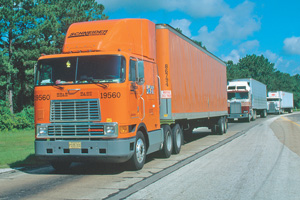ATA Unveils Sustainability Initiative for Trucking Industry

American Trucking Associations and a group of trucking companies Thursday launched a program of initiatives to move the trucking industry toward a more sustainable future, which includes steps to reduce carbon dioxide emissions from heavy trucks.
Launched under the banner “Trucks Deliver a Cleaner Tomorrow,” the industry-wide environmental sustainability program identifies a series of initiatives to reduce fuel consumption and CO2 emissions, the group said.
ATA President Bill Graves praised the program as a “landmark effort that will join all trucking industry stakeholders to work together on these issues.”
“ATA has committed itself to a series of measures that can reduce fuel consumption by 86 billion gallons and CO2 emissions by 900 million tons for all vehicles over the next 10 years,” Graves said. “Our proposals are practical, reasonable, and doable. They make environmental sense, and they make common sense.”
He was joined at the program’s launch in Washington by Margo Oge, director of the Environmental Protection Agency’s Office of Transportation and Air Quality, and the chief executive officers of several prominent trucking companies including FedEx Freight, UPS Inc., Schneider National, Titan Transfer and Con-way Inc.
Schneider, the largest U.S. truckload carrier, said that as part of the plan it would slow its fleet to 60 miles per hour. The environmental impact of just a 3-mph reduction will reduce the fleet’s consumption of diesel fuel by more than 3.75 million gallons a year, Schneider said.
The group’s report was developed by ATA’s Sustainability Task Force, headed by ATA Vice Chairman Tommy Hodges, who is also chairman of Titan Transfer.
The program’s recommendations, which are displayed on a new Web site, www.trucksdeliver.org, include:
• Setting speed governors on new trucks to limit speeds to no more than 68 mph and reduce the national speed limit to 65 mph for all vehicles;
• Reducing engine idling;
• Increasing fuel efficiency by encouraging participation in the Environmental Protection Agency’s SmartWay Transport Partnership Program;
• Reducing congestion by improving highways, and if necessary, by raising the fuels tax.
• Using more productive truck combinations; and
• Supporting national fuel economy standards for trucks.

